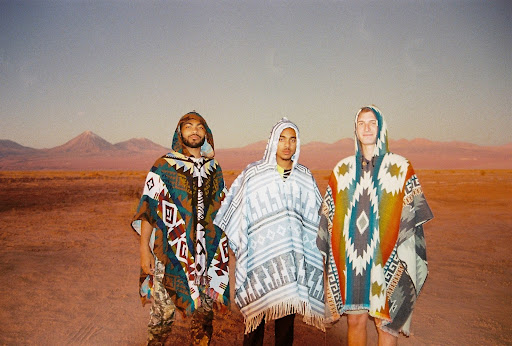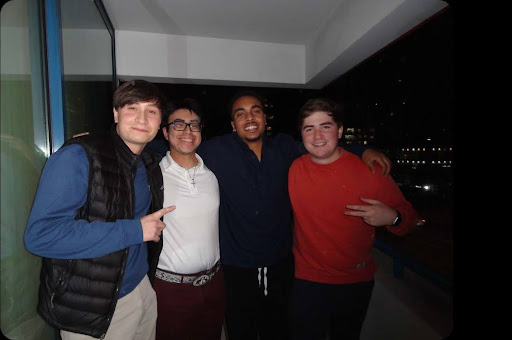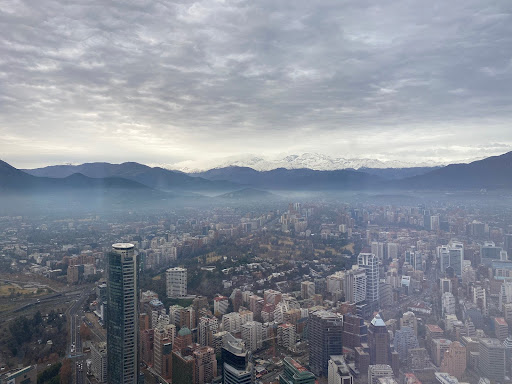Let's Talk Human Rights

Study Abroad in Santiago, Chile - Reflections from Graduating Seniors
By Javier Castillo Jr. '24 and Noah Jones-Beyene '24
Noah Jones-Beyene
This past summer, a group of students from the University of Dayton were given the opportunity to travel across the world and live in Santiago, Chile for a month. Before applications for this study abroad experience opened, the university recognized that this could financially be a challenge for certain families and students to be a part of. The Curran-Renzetti scholarship allowed us to be a part of a life-changing experience. An experience that allowed us to immerse ourselves into a different culture, attend a university in another country, live independently, network globally, enhance our resume, build perseverance and adaptability skills, and create lifelong lasting memories. This brief blog will not only highlight our travel experiences but is also a thank you to the Curran-Renzetti families who helped make this opportunity a reality for us.
As someone who values nature and the environment immensely, seeing the natural wonders of Chile was one of my favorite things to engage in while being there. From a 10-mile hike in the Andes to see a gorgeous waterfall, to the long days we spent in the desert observing ancient carvings and the salt lagoons, to the star gazing we did in the Atacama desert with its clear skies, there was not a moment of dullness regarding the nature of Chile.
Every step on a hiking trail is a lesson in its history, and learning about nature's history in another country was profound. This presented us with the opportunity to witness nature's masterpieces up close. The ancient carvings we saw on our hikes were not only beautiful pieces of artwork but also a valuable aspect of history aiding our understanding of the Atacama desert. These communal trails were also an opportunity to engage with locals who were also hiking. Many of these people were extremely friendly and often shared a hello or good morning depending on the time of day it was. One couple even asked if we had toilet paper for the bathrooms, which was kind of an odd exchange. However, these interactions were a part of the experience and sometimes this camaraderie forged on these trails can lead to friendships and quality memories. There’s a deep respect for the environment that comes with hiking and being outdoors, but these interactions with nature while in a foreign country truly changed the outlook we have on our environment.
Going to Chile was an experience that I will cherish for as long as I live. When I was applying, I was concerned that I would not be able to pay for the trip, but I was recommended to apply for the Curran-Renzetti scholarship. Applying for and obtaining the scholarship was a huge boon that allowed me to attend Chile to learn about human rights and sustainability.
 Caption: Adam Cardos (left), Javier Castillo Jr, Noah Jones-Beyene, and Jack Caulson (right) taking a picture of our first night in Santiago.
Caption: Adam Cardos (left), Javier Castillo Jr, Noah Jones-Beyene, and Jack Caulson (right) taking a picture of our first night in Santiago.
 Caption: view of Santiago from the top of the Costerna Center ( You can see the peaks of the Andes Mountains clearly from here).
Caption: view of Santiago from the top of the Costerna Center ( You can see the peaks of the Andes Mountains clearly from here).
Javier Castillo Jr.
In Chile, the Spanish spoken differs from the Spanish I grew up learning coming from a Mexican household. The most difficult part for me was getting adjusted to the different names they had for common objects like straws or beef. However, the differences are minor enough that I did not struggle to hold conversations with Chileans. It did not hit me that I was in a new country until a few days later when I started my daily routine I developed into taking a walk around the city to buy groceries. When I walked, it came to my mind that I had gotten so used to the city already that it did not feel as if I was a foreigner. I consider Chile another life-changing experience. It was an experience that allowed me to immerse myself into a different culture other than my own.
The experiences that had the most impact on me were going to the Atacama Desert and Villa Grimaldi. Villa Grimaldi was a detainee center during Pinochet’s dictatorship where prisoners were held and tortured. The government later made it a memorial park to honor and remember the atrocities and abuse of human rights due to constant protests to memorialize the area. Just being there in that space with such history had an impact on me. We learned and read about Villa Grimaldi earlier in the week during class. Learning about it and then visiting the site made the learning experience more engaging.
In Atacama, we spent a few days and overall it was a great trip. Besides the sightseeing, there was one instance where I could connect what I learned from my Sustainability class to the trip. We went to a small town near the Atacama desert called Toconao. A tour guide showed us around the town and even one of the five gardens that his family owns. In the garden are many fruits and vegetables with the occasional flowers. There is no need to put pesticides in the garden as there are spiders and other insects that take care of insects that can potentially damage the produce. The garden sustains itself all year round and is one of few instances I’ve seen a garden like this in my life. I admire how the residents care about sustainability by protecting the environment while utilizing it.
Before coming to Chile, I was concerned that I would not be able to pay the full tuition and not attend the program. When applying for the Chile Program, it was recommended that I apply for the Curran-Renzetti scholarship to help with paying for the program. I submitted my application and patiently awaited the results. To my great surprise, I was awarded the scholarship and I am eternally grateful to the families for giving me the opportunity to grow as a global citizen and as an individual. This trip has strengthened my dream to be a changemaker in my life and leave a legacy of positive impact in my community and beyond.
Noah Jones-Beyene is a graduating senior from Columbus, Ohio at the University of Dayton. He is majoring in Environmental Biology with a minor in Sustainability and is passionate about protecting the environment and working in the renewable energy field.
Javier Castillo Jr. is a graduating senior from Chicago, Illinois majoring in International Studies. He is passionate about human rights and environmental issues with a dream to create change back home and beyond.
